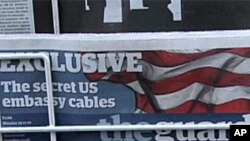Pakistan's foreign office on Wednesday dismissed fears over the safety of the nation's nuclear weapons revealed in leaked U.S. diplomatic cables.
The French News Agency quoted Pakistani foreign office spokesman Abdul Basit saying those "fears are misplaced."
U.S. diplomatic cables released by the website WikiLeaks show concerns about the security of Pakistani nuclear material and Islamabad's commitment to fighting insurgents along the country's border with Afghanistan.
The New York Times and The Guardian reported details of the cables Wednesday.
In a February 2009 cable, the U.S. ambassador to Pakistan, Anne Patterson, said American officials were concerned that someone working in a Pakistani nuclear facility could "gradually smuggle enough material out to make a weapon."
Another report said more financial or military assistance from the U.S. would not stop Pakistan from continuing to support Islamist militants, which Islamabad sees as part of its security strategy against rival India.
Meanwhile, Interpol has placed WikiLeaks founder Julian Assange on its most-wanted list after Sweden issued an arrest warrant for him as part of a rape investigation. The alert is likely to make international travel more difficult for Assange, whose whereabouts are unknown.
The latest round of leaked cables also said that small teams of U.S. special forces have operated inside Pakistan's tribal areas with the government's consent. They also show reports that Pakistan had delayed its promised transfer of spent nuclear fuel to the United States. Pakistani officials warned American officials that local media would portray the transfer as "the U.S. taking Pakistan's nuclear weapons."
The U.S. government is working to prevent future spills of U.S. secrets like the release of thousands of classified documents by WikiLeaks.
Officials said Tuesday that the U.S. State Department cut off the military's access to its database of diplomatic cables in an attempt to prevent another data leak.
Officials suspect a former intelligence analyst with access to the military's classified network - known as SIPRNet, or the Secret Internet Protocol Router Network - was the source for the leaked documents.
U.S. Defense Secretary Robert Gates said the WikiLeaks release is embarrassing, but is not having a big impact.
Cables released Tuesday reveal that most of the 200 U.S. tactical nuclear weapons based in Europe are located in Belgium, the Netherlands, Germany and Turkey. The countries have long been suspected of housing the warheads, but the leaked cables appear to be confirmation of that information.
A NATO spokeswoman told VOA Tuesday the leaking of any classified information, diplomatic or military, was "illegal, irresponsible and dangerous." Oana Lungescu declined further comment, saying that as a matter of policy NATO does not comment on classified information.
Other U.S. diplomatic cables leaked by WikiLeaks say Afghan President Hamid Karzai freed detainees without trial in Afghanistan because they had powerful connections. Afghanistan has not commented on Tuesday's disclosure.
The United States has condemned the WikiLeaks release of more than a quarter-million sensitive U.S. diplomatic cables.
The website has not identified the source of the documents. A U.S. Army intelligence analyst, Bradley Manning, was arrested earlier this year and is in military custody awaiting trial for allegedly leaking a 2007 video of a helicopter strike in Iraq and classified diplomatic cables to WikiLeaks.
















